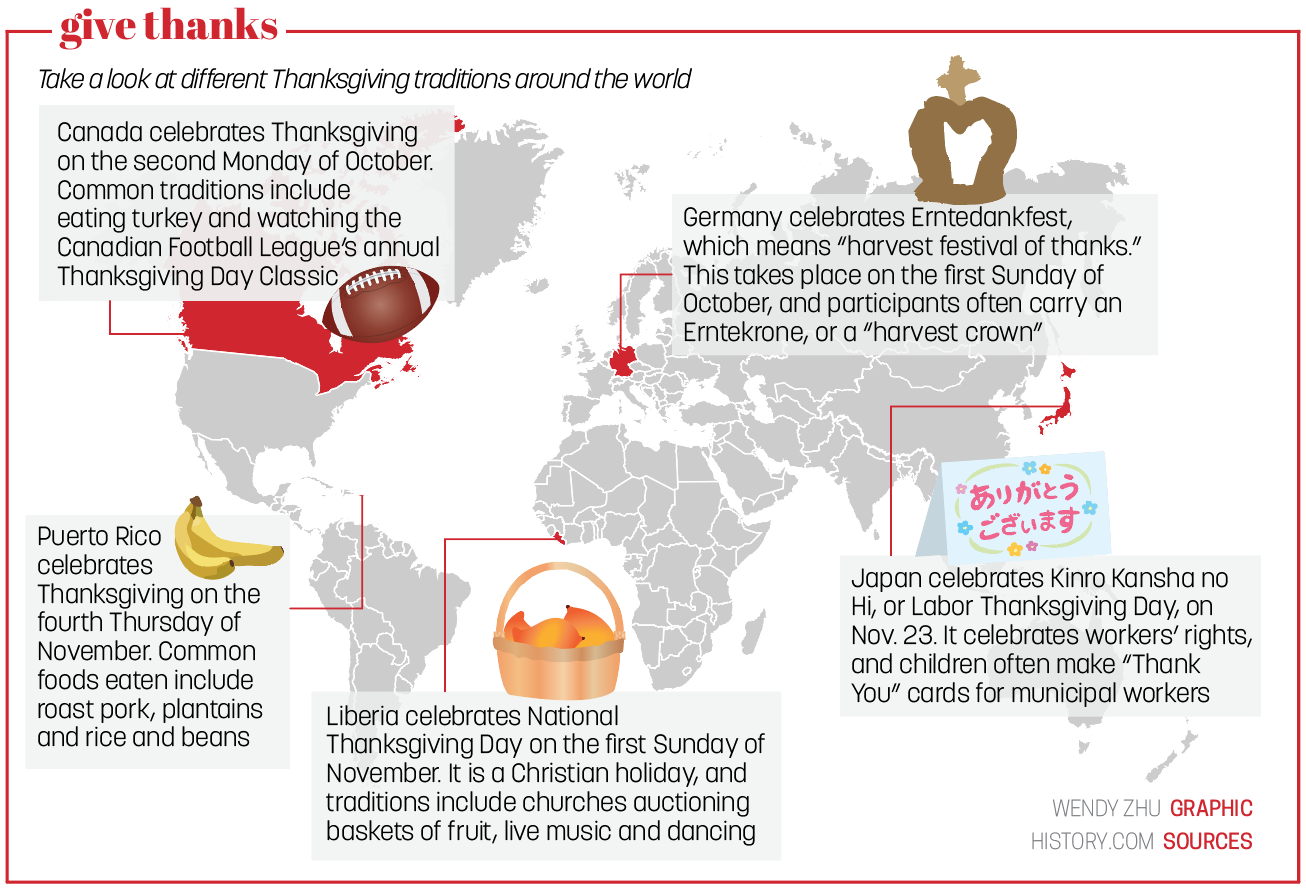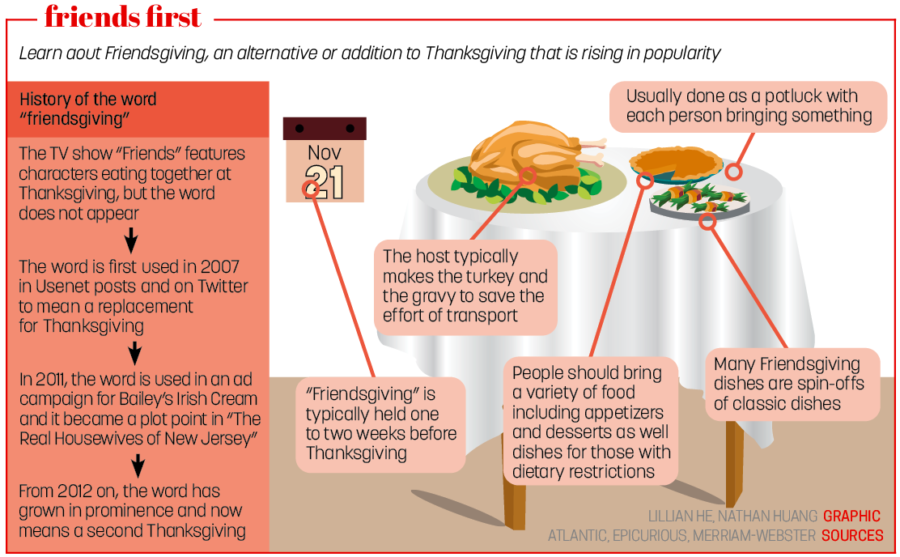For many people around the country, Thanksgiving is when they gather with their families to share a meal and say thanks for all that they have, in accordance with the feast of the pilgrims and their Native American friends back in the early 17th century.
However, the story that we tell, not only of the first Thanksgiving but of each other and how we celebrate the holiday, lends itself to being misunderstood. Our traditions have never been static or uniform, as Thanksgiving has become more institutionalized and as each family develops its own traditions.
In recent years, a new Thanksgiving tradition has risen in popularity — Friendsgiving.
Before the year 2012, the celebration was relatively unheard of. A Google Trends analysis of searches for the term “Friendsgiving” from the years 2003 through 2018 shows that in 2013, interest spiked. Each year since, searches for the term have almost doubled from the year before.
This year, sophomores Regan Wakeman and Alana Kusel have planned their own Friendsgiving celebration.
“This will be my first time. I actually threw my first party last month. I had never had like a formal birthday party before,” Wakeman said. “I had a Halloween party last month. And my friend, who I co-hosted it with, we were just joking about having a party every day, and then every month, and then we were like, actually that would be fun. Because it was really great to be able to take a moment to just look away from the stresses of school pressure (and) other things and just take a moment to be with my friends and just laugh.”
According to world history teacher Katie Kelly, the first Thanksgiving likely took place during the second fall after the pilgrims’ arrival.
Kelly said, “It was being thankful for that first harvest because for the first time, they actually had food and they had learned how to grow that food. There is some truth to the narrative of making friends with the natives, who taught them how to grow crops, (but) really the natives more felt sorry for these helpless white people, these helpless Europeans, and so they taught them how to grow some of the crops. Now, was it this huge event where everybody was singing songs together? I don’t think that’s true. But I do think that (there) was a sense of that thanksgiving for having food to hopefully survive the winter.”
For a long time after that first gathering, Thanksgiving hadn’t become a national holiday. In 1789, President George Washington issued a proclamation that a day of thanks should be celebrated on the last Thursday of November, but it did not become an annual celebration. In 1863, President Abraham Lincoln proclaimed that Thursday, Nov. 26 of the same year would be celebrated as a national holiday. During the Great Depression, President Franklin D. Roosevelt set Thanksgiving to the third Thursday of November in order to boost the economy by creating extra time between Thanksgiving and Christmas. In 1941, he changed the date to the final Thursday of November.
“So the tradition evolved a lot,” Kelly said. “(The biggest difference between Friendsgiving and Thanksgiving) is that you have fewer traditions with the Friendsgiving because it’s not something that you grew up with.”
Perhaps, for this reason, Wakeman and Kusel will be starting largely from scratch, asking guests to bring their own favorite foods, while the two hosts will cook what Kusel referred to as “basic Thanksgiving food” as well as vegan and vegetarian options.
Kelly, Wakeman and Kusel will all celebrate a Friendsgiving this year, but it won’t replace a family Thanksgiving gathering, and similar themes are shared between the two, despite their differences
“At regular Thanksgiving, my family, we always like tell each other how much we mean to each other things we’re thankful for and things like that. And I think it’s really important to do that with your friends because your friends are so important and vital in your life, and I think it’s a good opportunity for everyone to tell each other what they mean to each other,” Kusel said.
“I love Thanksgiving because it’s the one time of the year where people get together with their families and it’s not about exchanging gifts. It’s not about what do I get? What do I give?” Kelly said. “It’s all about just being together. And there’s something special that happens when you share food with someone, that physical breaking bread going all the way back, you know, to ancient tradition and all religions, all traditions that it brings people together. And that’s why I think it’s really important because it is that moment where people can just enjoy their family and their friends.”


































![AI in films like "The Brutalist" is convenient, but shouldn’t take priority [opinion]](https://hilite.org/wp-content/uploads/2025/02/catherine-cover-1200x471.jpg)








































![Review: “The Immortal Soul Salvage Yard:” A criminally underrated poetry collection [MUSE]](https://hilite.org/wp-content/uploads/2025/03/71cju6TvqmL._AC_UF10001000_QL80_.jpg)
![Review: "Dog Man" is Unapologetically Chaotic [MUSE]](https://hilite.org/wp-content/uploads/2025/03/dogman-1200x700.jpg)
![Review: "Ne Zha 2": The WeChat family reunion I didn’t know I needed [MUSE]](https://hilite.org/wp-content/uploads/2025/03/unnamed-4.png)
![Review in Print: Maripaz Villar brings a delightfully unique style to the world of WEBTOON [MUSE]](https://hilite.org/wp-content/uploads/2023/12/maripazcover-1200x960.jpg)
![Review: “The Sword of Kaigen” is a masterpiece [MUSE]](https://hilite.org/wp-content/uploads/2023/11/Screenshot-2023-11-26-201051.png)
![Review: Gateron Oil Kings, great linear switches, okay price [MUSE]](https://hilite.org/wp-content/uploads/2023/11/Screenshot-2023-11-26-200553.png)
![Review: “A Haunting in Venice” is a significant improvement from other Agatha Christie adaptations [MUSE]](https://hilite.org/wp-content/uploads/2023/11/e7ee2938a6d422669771bce6d8088521.jpg)
![Review: A Thanksgiving story from elementary school, still just as interesting [MUSE]](https://hilite.org/wp-content/uploads/2023/11/Screenshot-2023-11-26-195514-987x1200.png)
![Review: "When I Fly Towards You", cute, uplifting youth drama [MUSE]](https://hilite.org/wp-content/uploads/2023/09/When-I-Fly-Towards-You-Chinese-drama.png)
![Postcards from Muse: Hawaii Travel Diary [MUSE]](https://hilite.org/wp-content/uploads/2023/09/My-project-1-1200x1200.jpg)
![Review: "Ladybug & Cat Noir: The Movie," departure from original show [MUSE]](https://hilite.org/wp-content/uploads/2023/09/Ladybug__Cat_Noir_-_The_Movie_poster.jpg)
![Review in Print: "Hidden Love" is the cute, uplifting drama everyone needs [MUSE]](https://hilite.org/wp-content/uploads/2023/09/hiddenlovecover-e1693597208225-1030x1200.png)
![Review in Print: "Heartstopper" is the heartwarming queer romance we all need [MUSE]](https://hilite.org/wp-content/uploads/2023/08/museheartstoppercover-1200x654.png)




